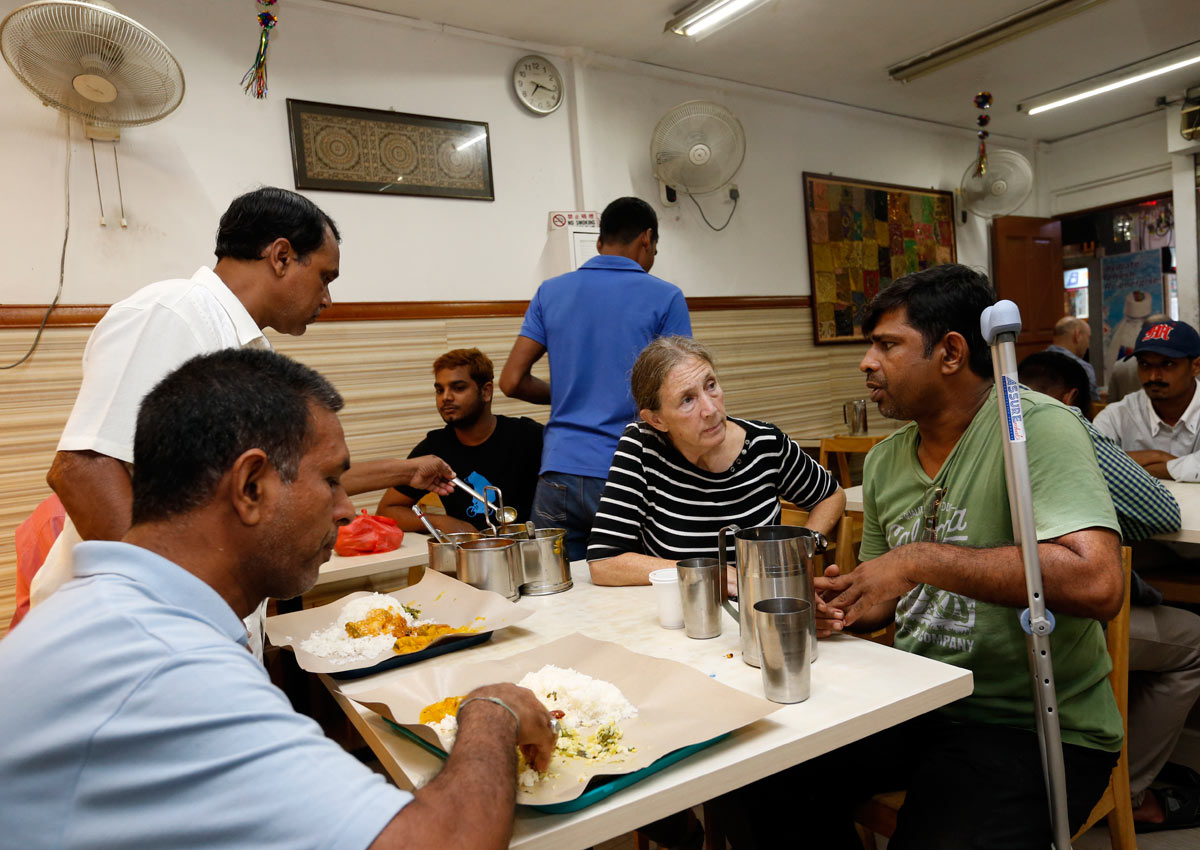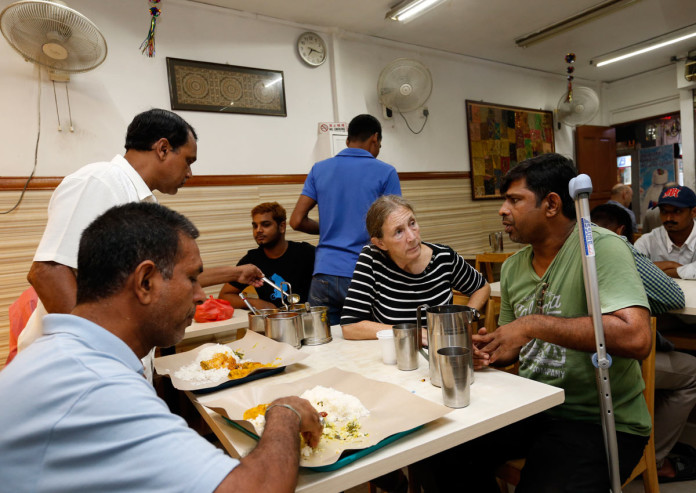Ask a foreign construction worker what he thinks of Singaporeans, and he will likely say “honest, polite and considerate”.
But he may also be getting fleeced of thousands of dollars by his employers just to keep his job, says Transient Workers Count Too (TWC2) volunteer Debbie Fordyce.
Several student groups who approached her in the course of their schoolwork felt that anti-foreigner sentiment is the root cause of the plight of low-wage migrant workers, but the TWC2 executive committee member says this is not true.
“There are structural problems causing employers to cut corners for things like food, accommodation and protective equipment,” she says.
She says the work permit system results in workers not having the freedom to switch jobs easily, and gives them little say in where they live, how much they are paid, and how much they have to pay in recruitment fees or kickbacks.
One of thestrongest advocates for better working and living conditions for low-wage migrant workers, TWC2 was set up after a domestic worker was beaten to death by her employer in 2001. It was originally formed in 2003 as The Working Committee 2 by a group of activists to raise awareness about domestic workers’ needs, such as rest days.
It was registered as a society and took on its current name in 2004.
Read Also: Medical and dental care offered to migrant workers for a small sum
Four years later, during the economic downturn, TWC2 was alerted to large numbers of foreign workers sleeping in the streets of Little India. “There were people lining the five-foot-ways with their belongings. Companies didn’t know what to do for them, and couldn’t house them,” says Ms Fordyce.
TWC2 started giving workers free meals, and today the Cuff Road Project serves meals 11 times a week, helping 500 to 600 people each month. These are men on Special Passes who are unable to work after lodging an injury or salary claim with the Manpower Ministry.
One of those who visited Alankar Restaurant in Dunlop Street for dinner earlier this month was Mr Shaikh Mohammad Sahidul, 33, whose kneecap was dislocated after he slipped and fell into a hole at his worksite in May.
Speaking to Insight, he said he has not been paid for several months, and he moved out of his dormitory to live with his brother as he feared the company and other workers would scold him for not working.
He relies on relatives for money while waiting for his Work Injury Compensation claim to go through, and for his knee to heal. “If not for the free meals, the problems would have been much worse,” he said.
Besides providing food, TWC2 also helps with ez-link card top-ups so workers can go for their hospital appointments. It also helps workers pay for urgent medical treatment.
Ms Fordyce says providing such services helps TWC2 better understand workers’ problems but she adds: “We don’t see charity as the answer. Advocacy comes first.”
Although working mostly with those who are out of work could result in a blinkered view of the lot of foreign workers – they only see those with problems – there is still a sizeable group who needs help, she says. Once or twice a month, TWC2 organises excursions, like a recent trip to Orchard Road to see the Christmas lights, so jobless workers can take their mind off the stress of having no income.
Read Also: Kudos to NGOs that help Singapore’s migrant workers
It still assists women who seek help, providing emergency shelter in volunteers’ homes. It lacks the funds to run a dedicated shelter, which would cost about $100,000 a year, including a staff member, says TWC2 vice-president Russell Heng.
He and Ms Fordyce both agree that some things have improved for workers. Whereas they once encountered a worker who was on a Special Pass and out of work for six years, now only a few go beyond two years.
And these days, airport police know they can call TWC2 if a worker alerts them that he is being forcefully repatriated, says Mr Heng.
The group, currently headed by polytechnic lecturer Noorashikin Abdul Rahman, has also seen its own premises improving, moving from a room in a volunteer’s home to bigger offices in Golden Mile Complex.
It now has a database for case notes on each worker it helps, and a volunteer management system, both developed by Singapore Management University students.
But the challenge of garnering enough financial support and manpower remains. Last year, TWC2 needed about $500,000 to run its programmes. Mr Heng is concerned the slowing economy may affect people’s desire to donate.
TWC2 is careful not to help workers who also seek assistance from other NGOs, so as not to duplicate work and spend resources that could go to someone else who needs it. And they turn away workers whose stories are dodgy, Ms Fordyce says.
Mr Heng says he is thankful TWC2 “had stamina”, and for his circle of like-minded friends there. “But it’s not that I want this to go on forever. My wish is we can close shop tomorrow because the problems are solved.”

This article was first published on December 18, 2016.
Get a copy of The Straits Times or go to straitstimes.com for more stories.







